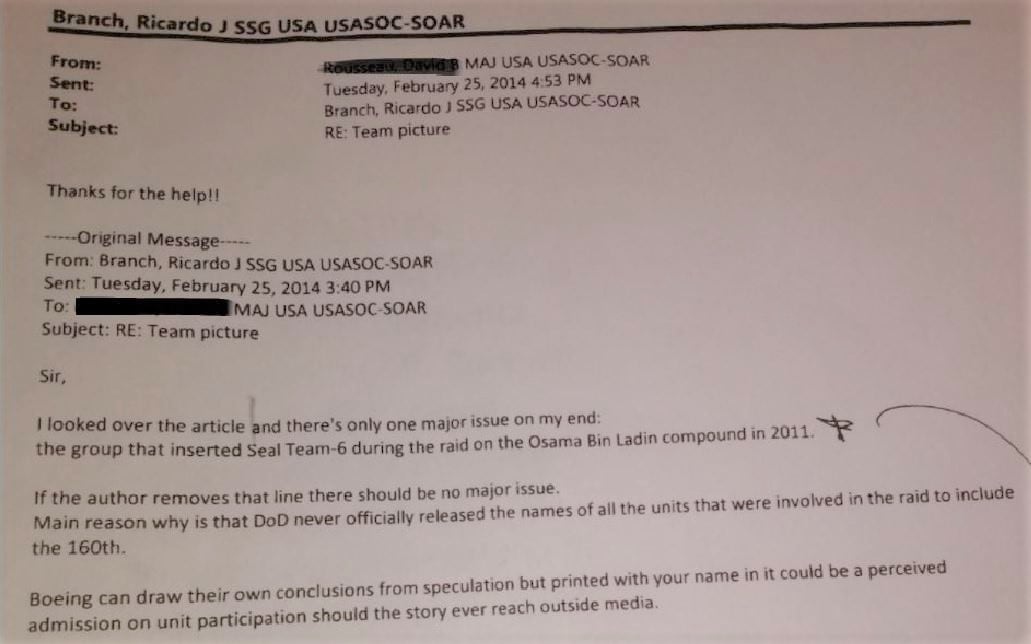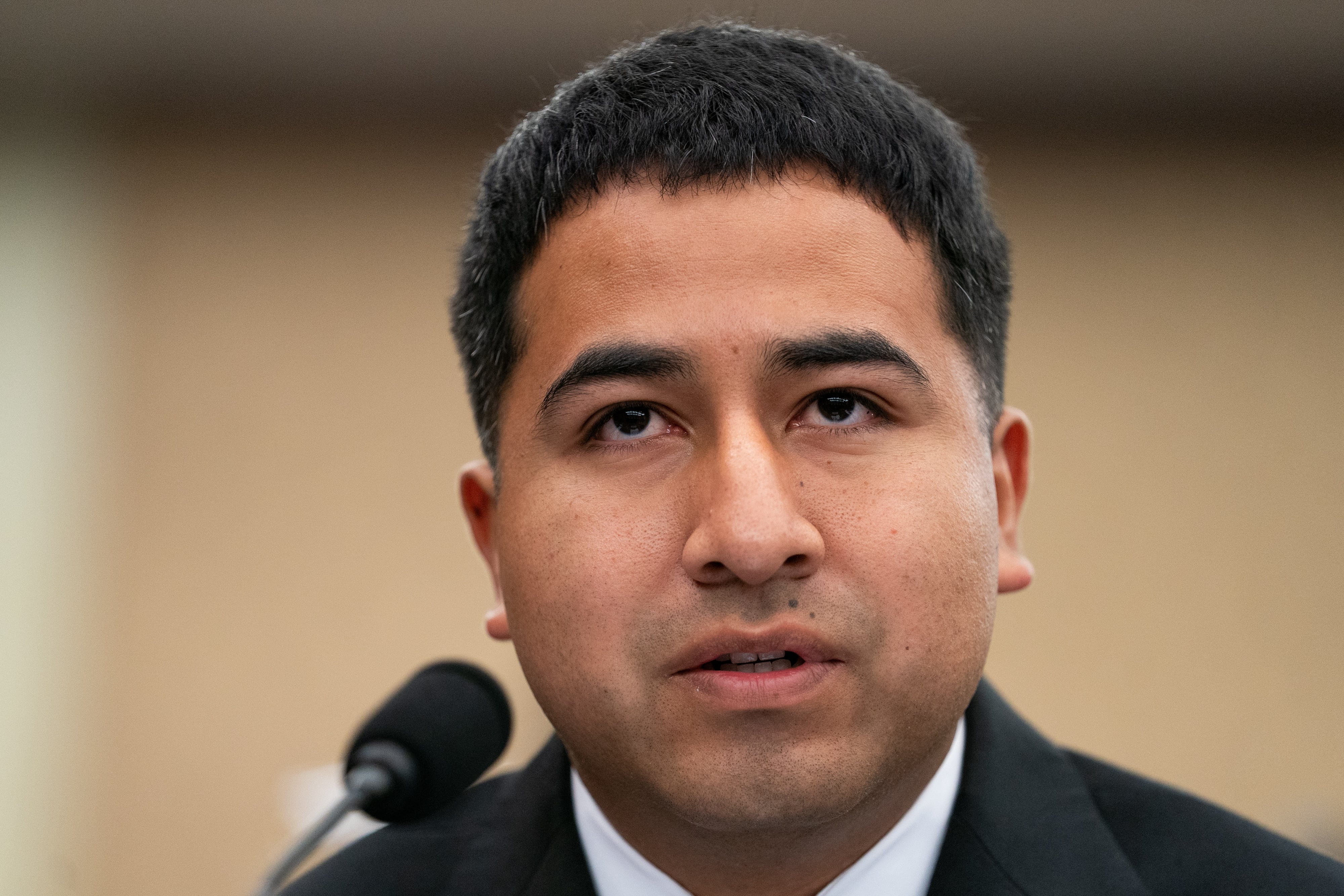A bizarre and frustrating tale of military bureaucracy that involves classified information from the 2011 Osama Bin Laden raid comes to a head next month.
Staff Sgt. Ricardo Branch, 38, an Iraq War veteran who is three years from retiring, will face a separation board over allegations that he fraudulently reenlisted after being punished for writing in a military email the name of the unit that flew commandos to kill the notorious al-Qaida leader nearly a decade ago.
“It’s just so absurd because the information was already released by the Army,” Branch said during a telephone interview, pointing to an official Army release from 2011 that names the unit and links them to the raid three years before he did.
Branch and his attorney, retired Army Lt. Col. Jeffrey Addicott, plan to go before the separation board in October at Branch’s duty station of Fort Bliss, Texas, to argue that the soldier should be allowed to finish his Army career. Branch rejoined in 2018 after being separated the year prior due to the security violation, which Addicott called a “bogus charge" to begin with.
“They coded him to allow him to reenlist and then, years later, they say it should have been coded to not allow him to reenlist. That’s what this chapter is about now,” said Addicott, a former judge advocate who represents Branch pro bono through the Warrior Defense Project at St. Mary’s University in San Antonio.
The origins of Branch’s Kafkaesque story have been reported before, laid out in detail by author Jack Murphy at ConnectingVets Radio this spring and in two stories for the Washington Times three years ago.
The case began in February 2014, when Branch was working in the public affairs shop for the Army’s elite 160th Special Operations Aviation Regiment. Some 160th SOAR troops had recently toured a Boeing plant in Mesa, Arizona, and Branch was asked by a major from that group to review a Boeing press release about the visit prior to its publication.
Branch recommended in an emailed reply to the major that Boeing remove any mentions of the 160th SOAR’s participation in the raid on Bin Laden’s compound in Abbottabad, Pakistan, which had been included in Boeing’s first draft of the article and attributed to the major.
Although the 160th SOAR’s role in the operation was already well-known — in no small part because the Army stated it on their own website in 2011 — the Pentagon had technically not released the names of the units that participated.
Boeing agreed to the redaction, but problems for Branch were about to take hold.
Though the major who received Branch’s email appeared to have no issues with the recommendation, other officers apparently felt differently. Branch forwarded the email to his boss, then-Maj. Daniel “Allen” Hill, for his situational awareness, he said. Hill then brought it to the unit’s S-2. Hill did not respond to an attempt to contact him through a social media profile that matches his name and job.

Branch was then accused of sending classified information through an unsecured channel, and was eventually handed a local Article 15 for the incident. He also received a negative NCO evaluation report documenting the security violation when he attempted to switch units due to the toxic work environment he claims the situation created.
“The punishment seemed very draconian,” Branch said. “In the original email, I received the information from a commander, I gave him my guidance and we ultimately safeguarded the information. However, that information was already out.”
“I suppose someone could have called me on a SIPR phone … and read the article off in its entirety,” Branch added. “But I didn’t have a SIPR account."
Branch ultimately separated from the service in 2017. Three months later, after working retail in Clarksville, Tennessee, Branch decided to visit a recruiter to see whether there was any chance he could get back into the Army to earn his retirement.
To his surprise, there was. The reenlistment code on Branch’s discharge paperwork was a “1,” meaning he was fully qualified to rejoin, according to a redacted copy of his DD-214. Branch consulted with Addicott, who agreed there wouldn’t be a problem reenlisting if that’s what the code said.

Branch signed back up as an air defense artillery soldier, attended training at Fort Sill, Oklahoma, and reported to the 11th Air Defense Artillery Brigade at Fort Bliss in May 2018, where his Army career returned to normalcy. By this March, Branch was deployed to Camp Arifjan, Kuwait, and was trying to reenlist one last time to complete his retirement goal.
At that point, though, Branch’s request was denied and he was accused of a fraudulent enlistment, according to Addicott.
“I think it was simply a computer function screening through it all and saw the discrepancy," Addicott said. “At first, they said he could not reenlist and then they said he could, and now they said it’s all [his] fault.”
A commander’s report shared with Army Times stated that the specific reason for the denial was that Branch was separated back in 2017 under the Qualitative Management Program, which can deny senior NCOs continued service based on qualitative grounds, according to Army Human Resources Command.
Branch also checked “NO” on an enlistment questionnaire that asked whether he had been previously rejected for reenlistment, the commander’s report stated.
“I said ‘no’ because if I was denied service, my DD-214 would have reflected it,” Branch said. “And the recruiter looked in the system, and I wasn’t listed as a QMP, either.”
Officials from Branch’s current command did not comment on the circumstances of his case when reached for comment. They also declined to say whether Branch has received any negative evaluations since rejoining the Army.
“Out of respect and privacy policies, I cannot comment specifically on SSG Branch’s performance or any past administrative actions while assigned to [2nd Battalion, 43rd Air Defense Artillery Regiment]," said Maj. Albert Jernegan, the unit spokesman, adding, “but I can tell you that SSG Branch’s commitment to selflessly serve is not overlooked.”
Kyle Rempfer was an editor and reporter who has covered combat operations, criminal cases, foreign military assistance and training accidents. Before entering journalism, Kyle served in U.S. Air Force Special Tactics and deployed in 2014 to Paktika Province, Afghanistan, and Baghdad, Iraq.





